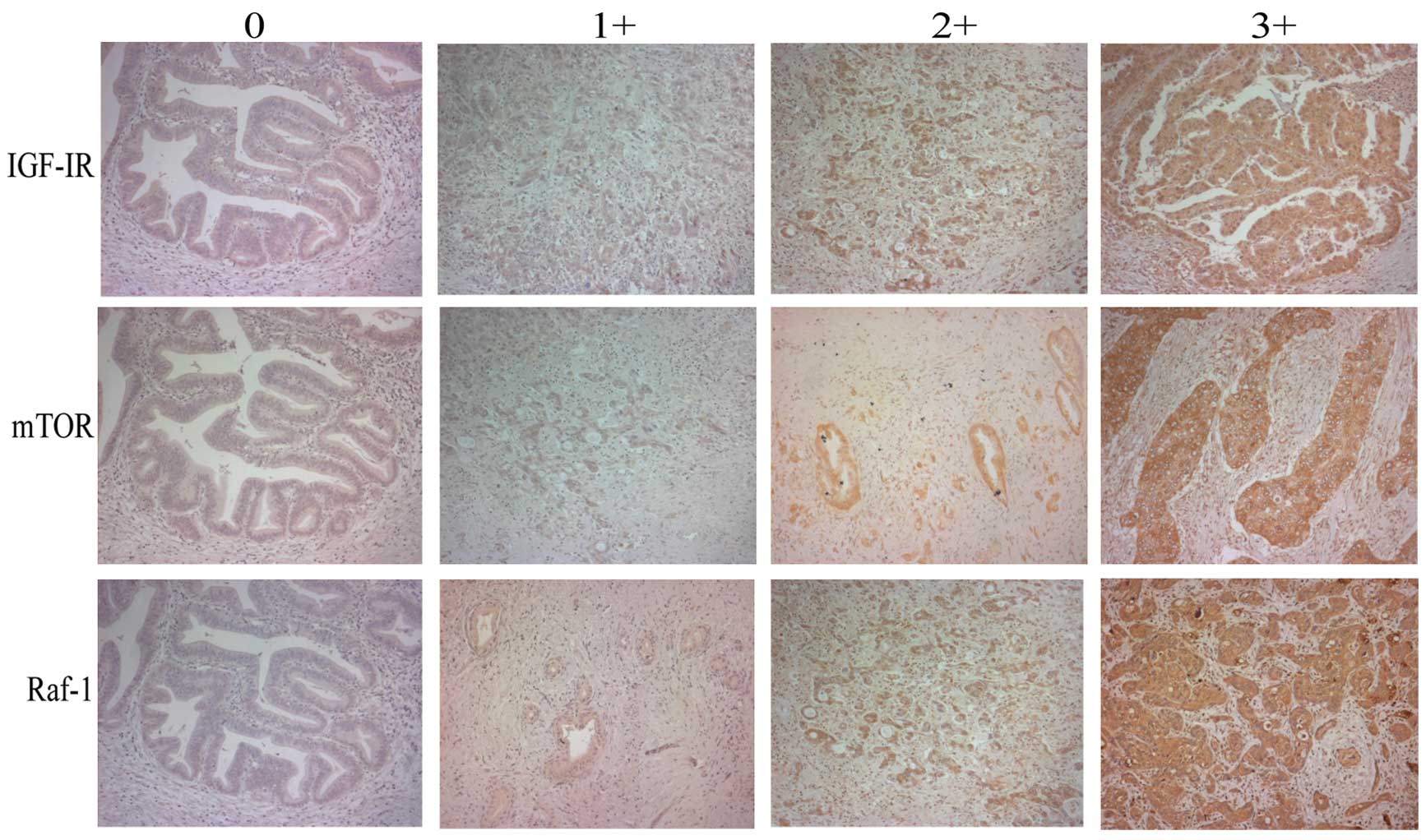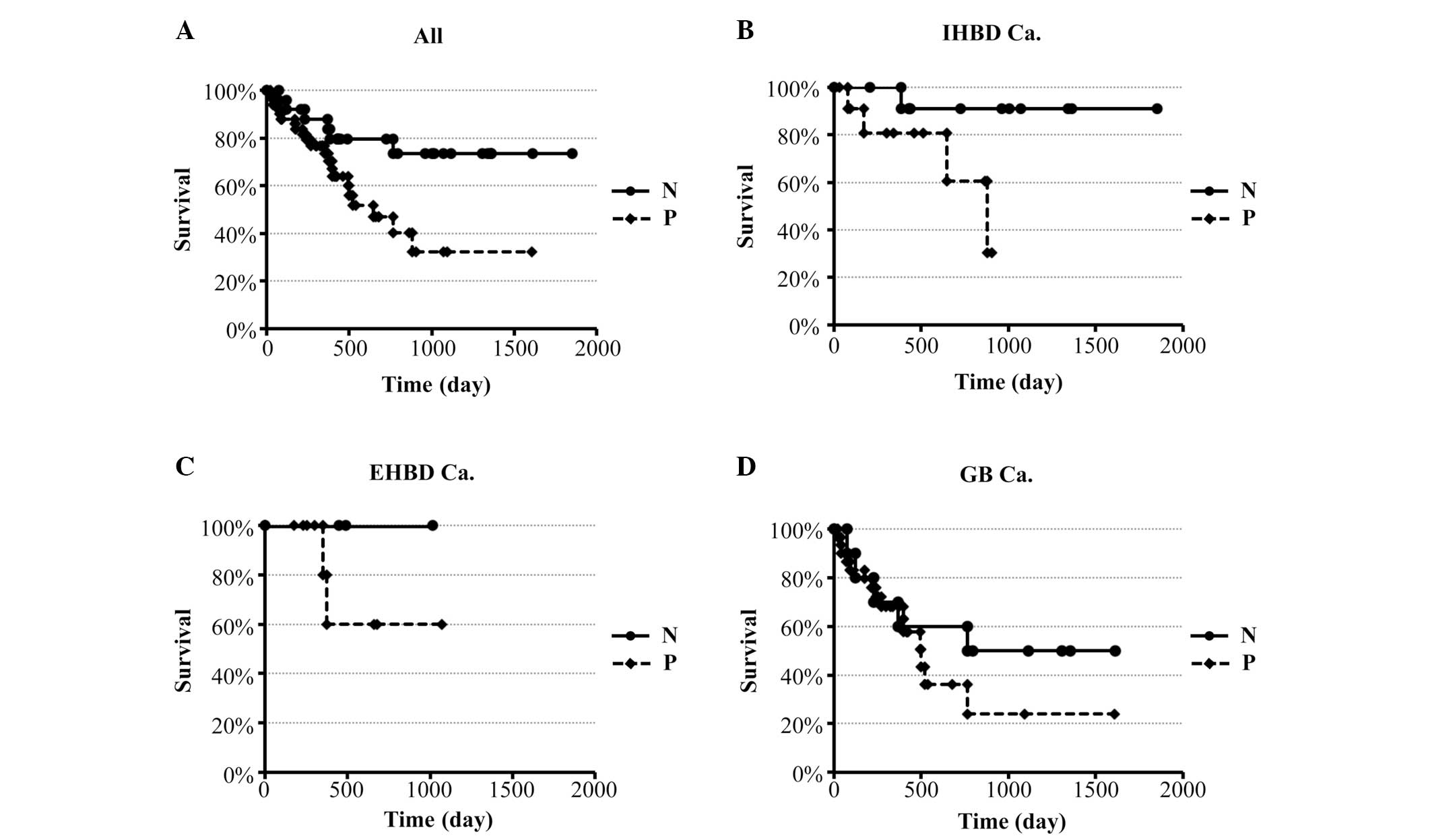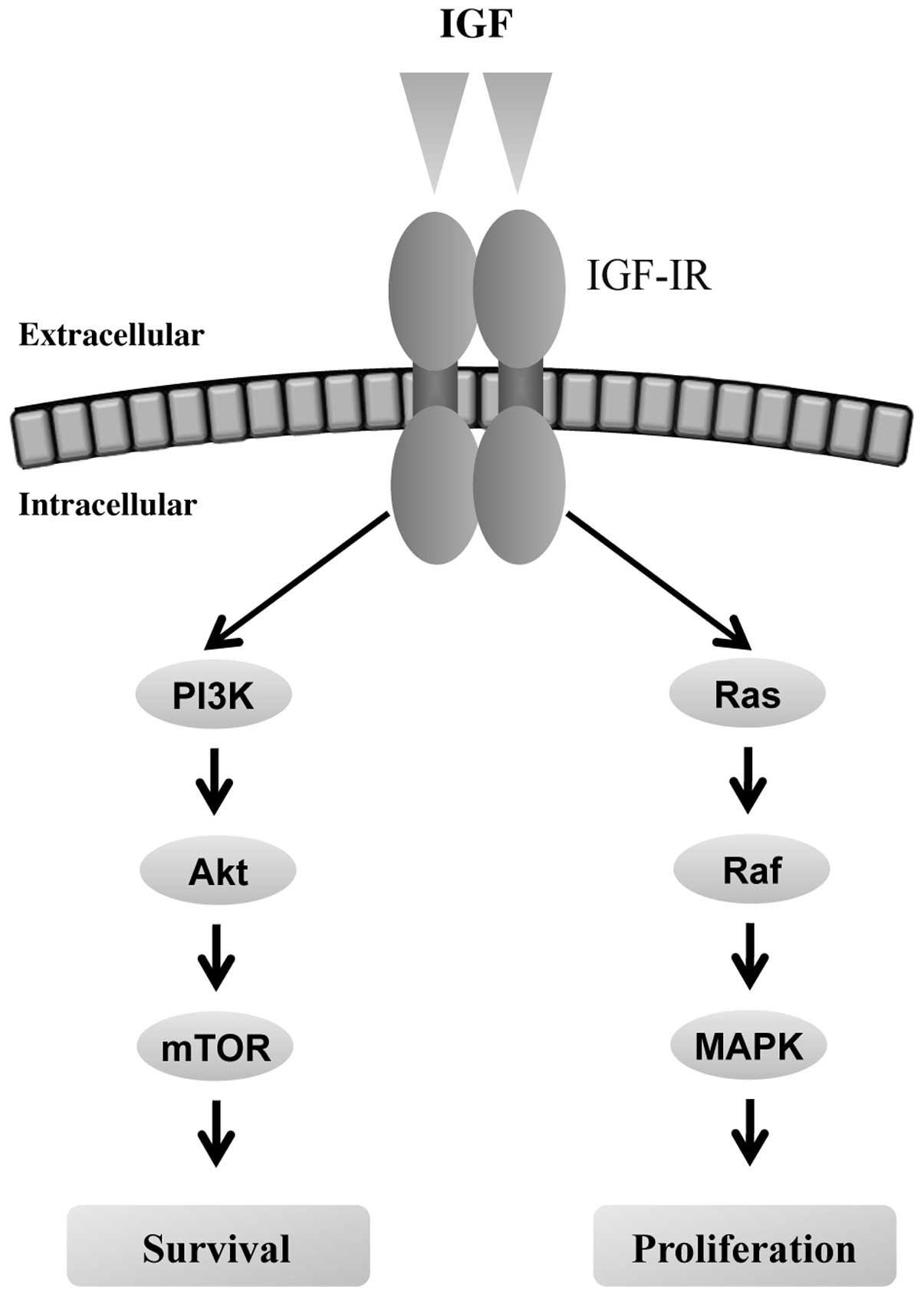|
1
|
Jarnagin WR, Ruo L, Little SA, et al:
Patterns of initial disease recurrence after resection of
gallbladder carcinoma and hilar cholangiocarcinoma: implications
for adjuvant therapeutic strategies. Cancer. 98:1689–1700. 2003.
View Article : Google Scholar : PubMed/NCBI
|
|
2
|
Shaib YH, Davila JA, McGlynn K and
El-Serag HB: Rising incidence of intrahepatic cholangiocarcinoma in
the United States: a true increase? J Hepatol. 40:472–477. 2004.
View Article : Google Scholar : PubMed/NCBI
|
|
3
|
Jemal A, Murray T, Ward E, et al: Cancer
statistics 2005. CA Cancer J Clin. 55:10–30. 2005. View Article : Google Scholar : PubMed/NCBI
|
|
4
|
Randi G, Franceschi S and La Vecchia C:
Gallbladder cancer worldwide: geographical distribution and risk
factors. Int J Cancer. 118:1591–1602. 2006. View Article : Google Scholar : PubMed/NCBI
|
|
5
|
Roa I, Araya JC, Villaseca M, Roa J, de
Aretxabala X and Ibacache G: Gallbladder cancer in a high risk
area: morphological features and spread patterns.
Hepatogastroenterology. 46:1540–1546. 1999.PubMed/NCBI
|
|
6
|
Medina E and Kaempffer AM: Cancer
mortality in Chile: epidemiological considerations. Rev Med Chil.
129:1195–1202. 2001.[(In Spanish)]. View Article : Google Scholar : PubMed/NCBI
|
|
7
|
Kimura K, Ohto M, Saisho H, et al:
Association of gallbladder carcinoma and anomalous
pancreaticobiliary ductal union. Gastroenterology. 89:1258–1265.
1985.PubMed/NCBI
|
|
8
|
Kawamoto T, Krishnamurthy S, Tarco E, et
al: HER receptor family: novel candidate for targeted therapy for
gallbladder and extrahepatic bile duct cancer. Gastrointest Cancer
Res. 1:221–227. 2007.PubMed/NCBI
|
|
9
|
Watanabe H, Date K, Itoi T, et al:
Histological and genetic changes in malignant transformation of
gallbladder adenoma. Ann Oncol. 10 (Suppl 4):136–139. 1999.
View Article : Google Scholar : PubMed/NCBI
|
|
10
|
Furstenberger G and Senn HJ: Insulin-like
growth factors and cancer. Lancet Oncol. 3:298–302. 2002.
View Article : Google Scholar : PubMed/NCBI
|
|
11
|
Papa V, Gliozzo B, Clark GM, et al:
Insulin-like growth factor-I receptors are overexpressed and
predict a low risk in human breast cancer. Cancer Res.
53:3736–3740. 1993.PubMed/NCBI
|
|
12
|
Matsubara J, Yamada Y, Hirashima Y, et al:
Impact of insulin-like growth factor type 1 receptor, epidermal
growth factor receptor, and HER2 expressions on outcomes of
patients with gastric cancer. Clin Cancer Res. 14:3022–3029. 2008.
View Article : Google Scholar : PubMed/NCBI
|
|
13
|
LeRoith D and Roberts CT Jr: The
insulin-like growth factor system and cancer. Cancer Lett.
195:127–137. 2003. View Article : Google Scholar : PubMed/NCBI
|
|
14
|
Mauro L and Surmacz E: IGF-I receptor,
cell-cell adhesion, tumor development and progression. J Mol
Histol. 35:247–253. 2004. View Article : Google Scholar : PubMed/NCBI
|
|
15
|
Reinmuth N, Fan F, Liu W, et al: Impact of
insulin-like growth factor receptor-I function on angiogenesis,
growth, and metastasis of colon cancer. Lab Invest. 82:1377–1389.
2002. View Article : Google Scholar : PubMed/NCBI
|
|
16
|
Imsumran A, Adachi Y, Yamamoto H, et al:
Insulin-like growth factor-I receptor as a marker for prognosis and
a therapeutic target in human esophageal squamous cell carcinoma.
Carcinogenesis. 28:947–956. 2007. View Article : Google Scholar : PubMed/NCBI
|
|
17
|
Kornprat P, Rehak P, Ruschoff J and
Langner C: Expression of IGF-I, IGF-II, and IGF-IR in gallbladder
carcinoma. A systematic analysis including primary and
corresponding metastatic tumors. J Clin Pathol. 59:202–206. 2006.
View Article : Google Scholar : PubMed/NCBI
|
|
18
|
Ohashi H, Adachi Y, Yamamoto H, et al:
Insulin-like growth factor receptor expression is associated with
aggressive phenotypes and has therapeutic activity in biliary tract
cancers. Cancer Sci. 103:252–261. 2012. View Article : Google Scholar : PubMed/NCBI
|
|
19
|
Karp DD, Paz-Ares LG, Novello S, et al:
Phase II study of the anti-insulin-like growth factor type 1
receptor antibody CP-751,871 in combination with paclitaxel and
carboplatin in previously untreated, locally advanced, or
metastatic non-small-cell lung cancer. J Clin Oncol. 27:2516–2522.
2009. View Article : Google Scholar : PubMed/NCBI
|
|
20
|
Asnaghi L, Bruno P, Priulla M and Nicolin
A: mTOR: a protein kinase switching between life and death.
Pharmacol Res. 50:545–549. 2004. View Article : Google Scholar : PubMed/NCBI
|
|
21
|
Richardson CJ, Schalm SS and Blenis J:
PI3-kinase and TOR: PIKTORing cell growth. Semin Cell Dev Biol.
15:147–159. 2004. View Article : Google Scholar : PubMed/NCBI
|
|
22
|
Wullschleger S, Loewith R and Hall MN: TOR
signaling in growth and metabolism. Cell. 124:471–484. 2006.
View Article : Google Scholar : PubMed/NCBI
|
|
23
|
Ito Y, Takeda T, Sasaki Y, et al:
Expression and clinical significance of the erbB family in
intrahepatic cholangiocellular carcinoma. Pathol Res Pract.
197:95–100. 2001. View Article : Google Scholar : PubMed/NCBI
|
|
24
|
Yukawa M, Fujimori T, Hirayama D, et al:
Expression of oncogene products and growth factors in early
gallbladder cancer, advanced gallbladder cancer, and chronic
cholecystitis. Hum Pathol. 24:37–40. 1993. View Article : Google Scholar : PubMed/NCBI
|
|
25
|
Suzuki H, Isaji S, Pairojkul C and
Uttaravichien T: Comparative clinicopathological study of resected
intrahepatic cholangiocarcinoma in northeast Thailand and Japan. J
Hepatobiliary Pancreat Surg. 7:206–211. 2000. View Article : Google Scholar : PubMed/NCBI
|
|
26
|
Ukita Y, Kato M and Terada T: Gene
amplification and mRNA and protein overexpression of c-erbB-2
(HER-2/neu) in human intrahepatic cholangiocarcinoma as detected by
fluorescence in situ hybridization, in situ hybridization, and
immunohistochemistry. J Hepatol. 36:780–785. 2002. View Article : Google Scholar : PubMed/NCBI
|
|
27
|
Leal P, Garcia P, Sandoval A, et al:
Immunohistochemical expression of phospho-mTOR is associated with
poor prognosis in patients with gallbladder adenocarcinoma. Arch
Pathol Lab Med. 137:552–557. 2013. View Article : Google Scholar : PubMed/NCBI
|
|
28
|
Leal P, Garcia P, Sandoval A, et al:
AKT/mTOR substrate P70S6K is frequently phosphorylated in
gallbladder cancer tissue and cell lines. Onco Targets Ther.
6:1373–1384. 2013.PubMed/NCBI
|
|
29
|
Wu Q, Kiguchi K, Kawamoto T, et al:
Therapeutic effect of rapamycin on gallbladder cancer in a
transgenic mouse model. Cancer Res. 67:3794–3800. 2007. View Article : Google Scholar : PubMed/NCBI
|
|
30
|
Kolch W: Meaningful relationships: the
regulation of the Ras/Raf/MEK/ERK pathway by protein interactions.
Biochem J. 351:289–305. 2000. View Article : Google Scholar : PubMed/NCBI
|
|
31
|
Cleveland JL, Troppmair J, Packham G, et
al: v-raf suppresses apoptosis and promotes growth of
interleukin-3-dependent myeloid cells. Oncogene. 9:2217–2226.
1994.PubMed/NCBI
|
|
32
|
Erhardt P, Schremser EJ and Cooper GM:
B-Raf inhibits programmed cell death downstream of cytochrome c
release from mitochondria by activating the MEK/Erk pathway. Mol
Cell Biol. 19:5308–5315. 1999.PubMed/NCBI
|
|
33
|
McPhillips F, Mullen P, Monia BP, et al:
Association of c-Raf expression with survival and its targeting
with antisense oligonucleotides in ovarian cancer. Br J Cancer.
85:1753–1758. 2001. View Article : Google Scholar : PubMed/NCBI
|
|
34
|
Riva C, Lavieille JP, Reyt E, Brambilla E,
Lunardi J and Brambilla C: Differential c-myc, c-jun, c-raf and p53
expression in squamous cell carcinoma of the head and neck:
implication in drug and radioresistance. Eur J Cancer B Oral Oncol.
31B:384–391. 1995. View Article : Google Scholar : PubMed/NCBI
|

















